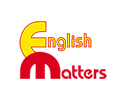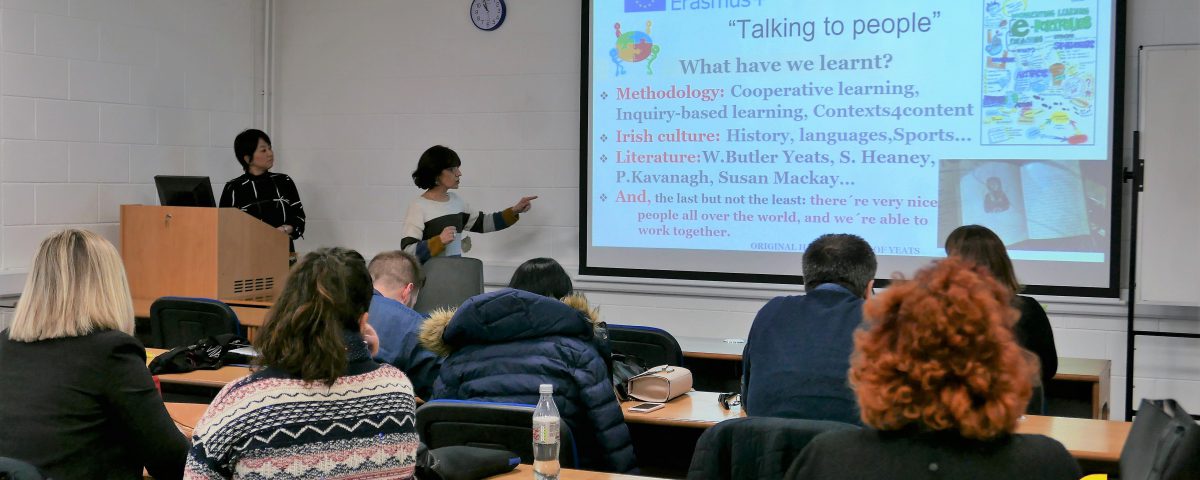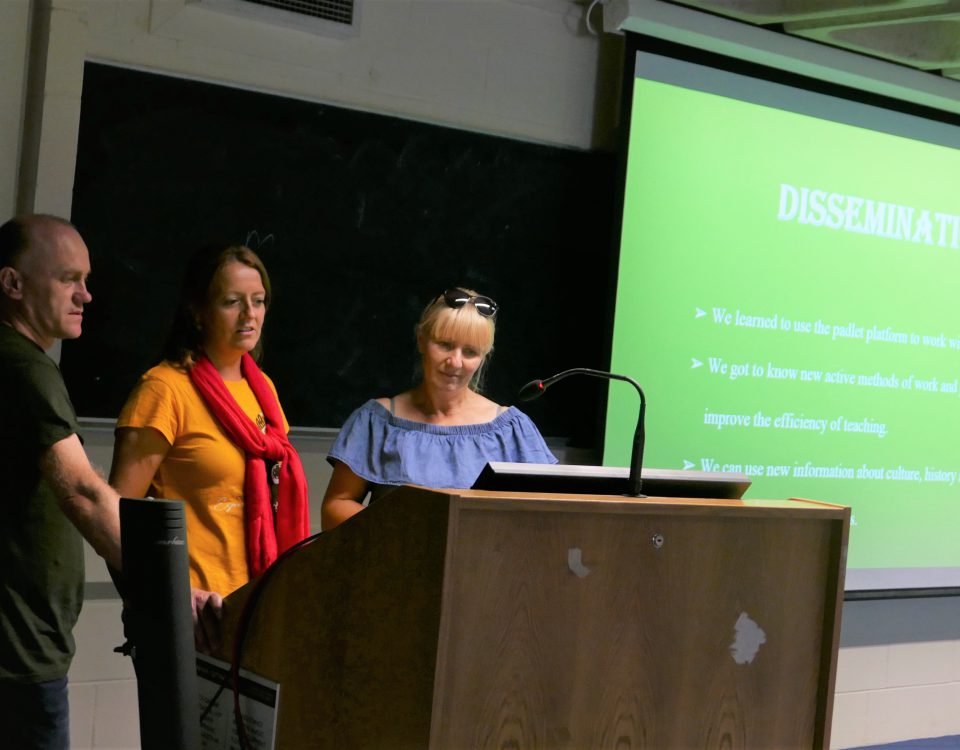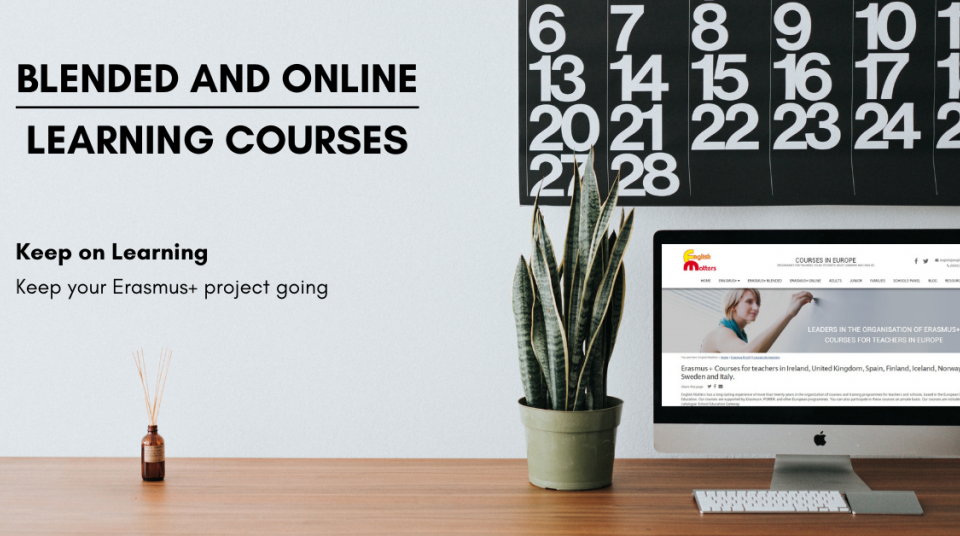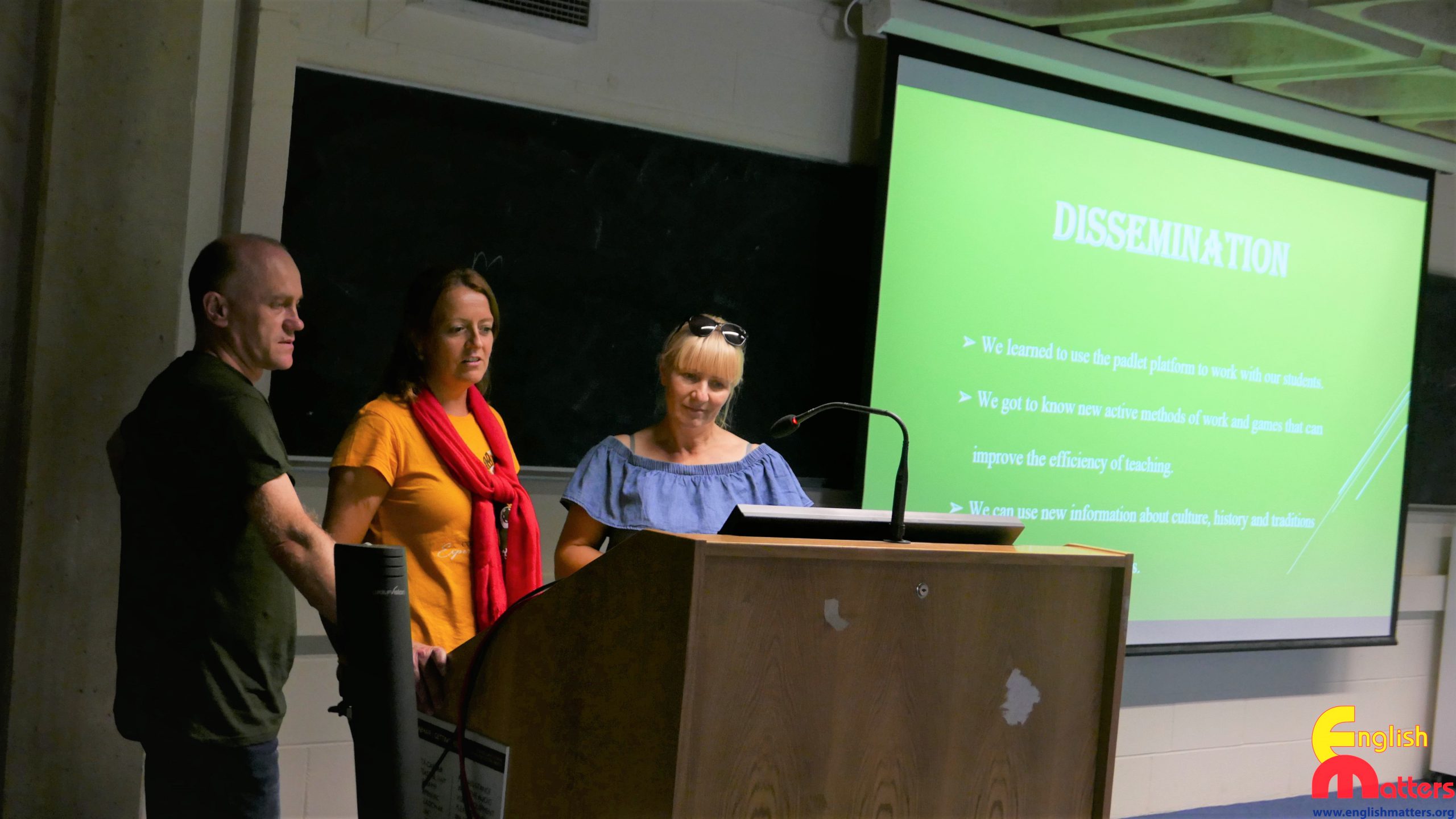
“The goal of education is the advancement of knowledge and the dissemination of truth”- John Fitzgerald Kennedy
15 octubre, 2020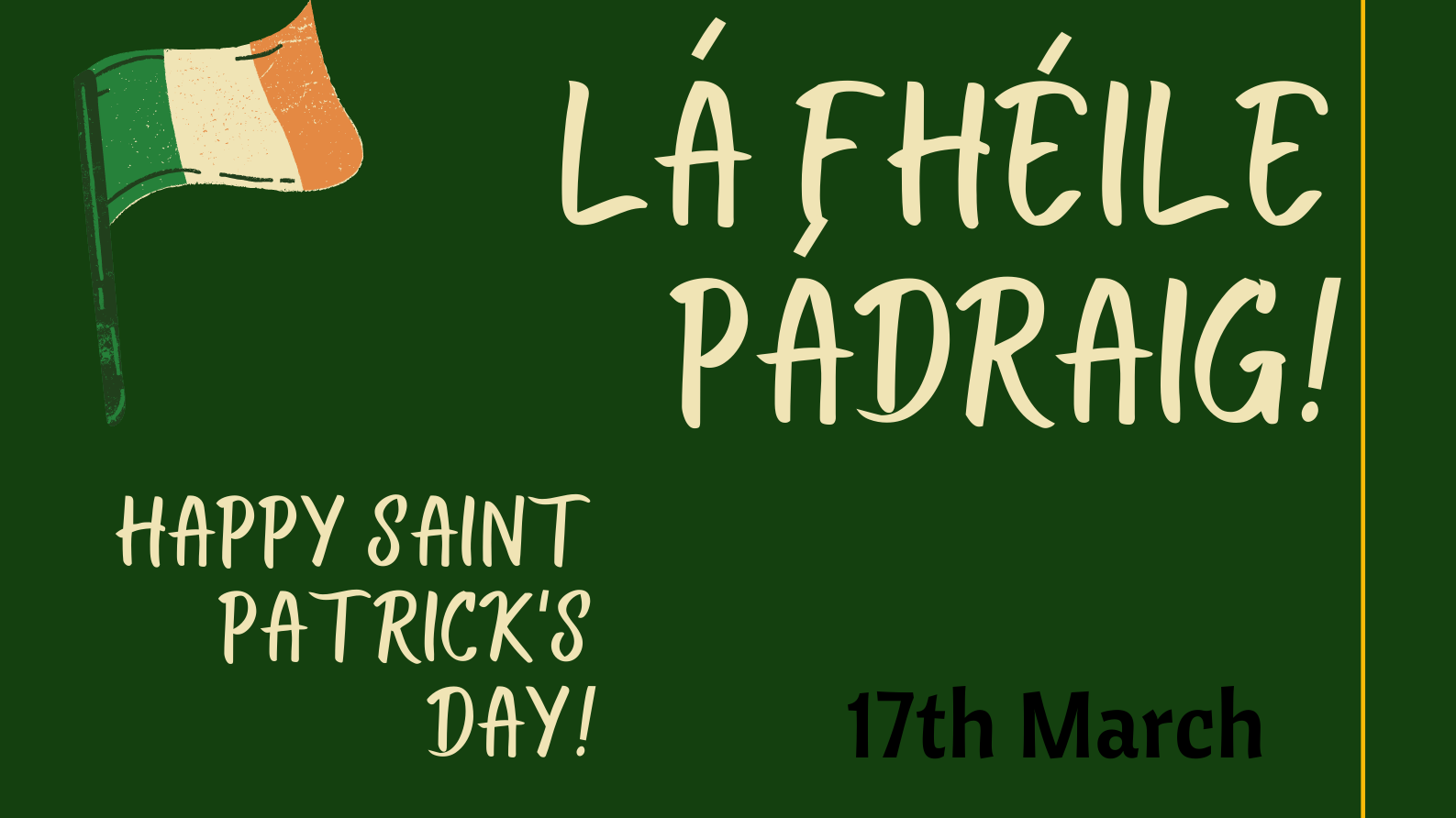
Learn all about St. Patrick’s Day
16 marzo, 2021Report: Erasmus+ In-Service European Program for Teachers

Talking to People: Inquiry-based and Cooperative Methodology
We recently received a warm-hearted letter from a participant on one of English Matters´courses, accompanied by a report she had written for a school journal. What made this report a little extra special was that it was published in Japan after Kay, an English teacher from Tokyo, participated in our Talking to People course in Dublin last year. It was with huge pride that we read the report and it was very special for us to know that some of the seeds sown during that week in Dublin reached all the way to Japan. To know that Kay is today teaching and sharing what she learned during the Talking to People course, from her 11 classmates and the different nationalities she encountered is extremely rewarding.
______________________________________________________________________________
Author: Orita Yoshikawa, Kyoko
This is a report on the Erasmus+ In-Service European Program for Teachers, held in Dublin, Ireland from February 24th to March 2nd, 2019. The report presents the overview of the program, the detailed description of the specialized course, Inquiry-based and Cooperative Methodology – Talking to People, the evaluative review of the program, and the author ‘s self-assessment in fulfilling the objectives.
Overview of Erasmus+ ln-Service European Program for Teachers
Erasmus+ is a program of European Union (EU) which supports education, training, youth and sports in Europe. Although Erasmus+ is known for educational exchanges at the tertiary level, it offers an opportunity for teachers, headmasters, trainers, and administrative staff of primary and secondary education to participate in international training courses organized in different EU nations.
One of the organizers for the Erasmus+ In-Service European Program for Teachers is English Matters. It is an independent organization based in Spain. It strives to meet the EU teachers’ professional development needs and works in cooperation with universities and training bodies throughout Europe. The course described in this report, Inquiry-based and Cooperative Methodology – Talking to People, is precisely one of the courses organized by English Matters. Its director is Mr. Eduardo Marin whose professional expertise dates back to 1992 when he developed an international teacher exchange program on the sidelines of a partnership between the Western Education and Library Board of Northern Ireland and the Andalucía Government in Spain.
The Erasmus+ In-Service European Program for Teachers by English Matters places emphasis on promoting intercultural learning and the European Dimension in education through the five key aspects:
- European Dimension & Erasmus+ Spirit: Openness – connectedness – sharing, and networking.
- Structured Continuous Professional Development (CPD) Course: Combination of seminars, lectures, workshops, and cooperative inquiry-based learning.
- Field Projects: The «Contexts4Content» approach to cultural, historical, geographical, geological, and social experiences with a curricular focus.
- Professional Development: Portfolio (Reflective journal & 3-slide task)
- Dissemination of learning into teaching practice and among educational communities.
The program is evaluated and assessed in align with the above key aspects by both the organizers and the participants at the end of the program.
Spring Program
The Erasmus+ In-Service European Program for Teachers was held in Dublin, Ireland from February 24th to March 2nd, 2019. It was a seven-day program covering forty hours on Erasmus+ CPD course. There were 96 participating teachers, headmasters, and trainers from 16 countries: Austria, Croatia, Czech Republic, Estonia, Finland, Germany, Greece, Italy, Latvia, Poland, Portugal, Romania, Slovakia, Slovenia, Spain, and Japan. The 96 participants were divided into five courses:
- Talking to People: Inquiry-based and Cooperative Methodology
- Content and Language Integrated Learning (CLIL) for Teachers
- Information and Communication Technology (ICT) for Teaching
- English for Teachers (A2, B1)
- Structured Educational Visit to Schools & Training Seminars in Ireland
Each course differs greatly on its focus and objectives that the occasions for all the participants to gather were limited to excursions, farewell outing, and opening and closing seminars.
Course: Inquiry-based and Cooperative Methodology- Talking to People
The uniqueness of the Inquiry-based and Cooperative Methodology – Talking to People course is the emphasis on interactive, cooperative learning. The participants are expected to interact not only with the course members and teacher-training personnel, but with the local people. They actually go outside of the classroom onto the street conducting «talking to people» interviews in collaboration with their classmates.
Being exposed to Irish culture and the way of life is also an essential aspect of this course. The participants join seminars and hands-on workshops covering the area of study such as Irish society, literature, history, geography, art and education. The guest speakers who specialize in the above area of study deliver lectures and workshops, along with the course coordinator, Ms. Stephanie Kelly.
For the duration of the course, the participants form collaborative groups working on their assigned Inquiry Based Learning Project (IBLP). As in the inquiry-based learning, the participants go through the stages of inquiry, investigation, processing, and creation. The participants work in collaboration with their groupmates inside and outside of the class, preparing for the portfolio presentation on the last day.
Participants in Talking to People
In the lnquiry-based and Cooperative Methodology – Talking to People course, there were 12 members from six countries registered: One from Austria, two from Croatia, one from Germany, two from Greece, five from Spain, and one from Japan. As for the age groups of students the participants taught, two specialized in the early childhood education, while one taught at a primary school. The rest taught in secondary schools including both junior and senior high school levels. Of the twelve, six taught English, one Biology, two P.E., and three general subjects. There was only one male in this course, and the majority of the participants had teaching experiences longer than a decade.
Reflective Journal
All the participants in this course were required to keep a reflective journal. It is an indispensable component for recording and recognizing one ‘s professional development. In this section, some excerpts from the reflective journal of the author will be shared.
Day 1: Sunday
The first half of the day was set aside for the arrival of participants to Ireland. In the latter half, all the participants and the staff gathered for the registration. The first seminar was conducted by the program director, Mr. Eduardo Mario. With a big grin on his face, he kindly welcomed all the participants from 15 EU nations, and one non-EU nation, Japan. Instead of referring to «European Dimension,» he used the term «15+1» in consideration for the one non-EU participant. Although the venue was packed with 96 participants, he went on greeting and introducing each participant with sincerity, as if to instill a sense of belonging. Such performance laid the common ground for the program objective: the promotion of the intercultural learning.
The individual introductions by Mr. Marin paved the way for the participants to naturally reach out to one another. In between small talks, there were questions regarding how my participation (a non-EU teacher’s participation) could be made possible for the Erasmus+ program, and whether the participation fee of the non-EU teacher was borne by the EU or not. Indeed, the participation of non-EU teachers in the EU teacher training program is a debatable topic. Bearing the European Dimension in education in mind, to exclude a non-EU teacher from the teacher program is justifiable let alone natural. It was Mr. Marin who opened up the window of opportunity to let a non-EU teacher join the program, and to have cultivated the fertile ground for accepting the concept of «15+1» among the participants. I am grateful and indebted for the opportunity granted.
Day 2: Monday
Ms. Stephanie Kelly, the main instructor for the Inquiry-based and Cooperative Methodology – Talking to People course, introduced the participants to some cooperative-learning activities: Clock activity, Gallery Walk, Think-Pair-Share, and Jigsaw method. The participants were given time to reflect on what they did, and how they could use it in their own classrooms. She also touched on «Green English» covering what Irish (Gaelic) was in relation to the English language. Her reference to Roddy Doyle ‘s comment that Ireland has a language and a half precisely summarized the introduction on the Irish language. In the evening, she took the participants on a field project, «lmages of lrish society.» The tour lasted for an hour and half, and covered the following areas in the order: Samuel Beckett Bridge 2009 (Harp bridge), Jeanie Johnston Famine ship (Coffin ship), Famine memorial statues, Custom House 1791 with an explanation of the Irish national flag and the Orange march in N. Ireland, the Abbey theatre, the James Joyce statue, the spire, the General Post Office, the O’Connell monument, Trinity College, Grafton Street, Molly Malone statue, Temple bar, and the Ha’Penny bridge. Strolling through narrow sidewalks of Dublin brought the 12 course members to converse with one another on an individual basis, bringing them much closer to one another. With Ms. Kelly as their teacher, the «Talking to People» group seemed to establish a sense of unity amongst themselves.

Day 3: Tuesday
The day began with uneasiness. It was dreadful heading to the workshops on Irish Literature. The regret of not having read the major literary works as an English teacher should, and the fear of exposing my ignorance to the world had my mind filled with shame. However, once the class had begun, the nervousness quickly evaporated. The lecturer, Ms. Carmel Hinchion, neither tested the participants on how much they have read so far nor judged them based on their background knowledge. Rather she welcomed them as they were, and kindly led them through her methods of introducing the Irish writers. With her arms wide open, she created the classroom to be a place safe enough for the participants, including myself, to share their reactions and thoughts. Finding myself making contributions to the class discussion and pair work was surprising, but a very pleasant discovery. It helped nurture my confidence, raised my interest in finding out more about the writers, and gave a chance to engage in my own learning actively.
Reflecting on this, although there is no intention on the teachers’ part to «judge» their students, many of my students may feel great anxiety in my class. They may be fearful of having their «ignorance» made public. (From a teacher’s perspective, no student is ignorant. The students are in the process of acquiring knowledge, and thus it is far from being in a state of ignorance). It is essential for the teacher to provide an assurance to each student regardless of their academic abilities. This is exactly what Mr. Marin and Ms. Hinchion did for the participants, the trainees. As teachers, it is crucial that such mind set be kept at all times.
In the afternoon, the workshop focused on the use of «sensuousness» in appreciating literary works. The use of «sensuousness» allows the readers to experience the literary work as their own, aiding the readers to have multi perspectives on certain issues. Through the class discussions, the participants shared an understanding that ‘the writers are the translators of a country,’ and ‘a teacher teaches values of life through his or her subject areas.’ The irreplaceable role of a teacher is to solicit the students to consider the ‘why’ instead of merely touching upon the ‘who, what, when, and where.’
Day 4: Wednesday
In the morning, Ms. Kelly gave a lecture on methodology related to cooperative learning along with actual in-class practice. She also touched upon the challenges of «grouping» the students, which turned out to be one of common concerns shared by all the participating teachers. The participants shared the challenges they faced in their educational institutions such as the parental complaints, the number of students per class, the difference among the students’ academic ability, the demand for constant regrouping, and so forth. Some of the members introduced ICT tools and some shared the educational games used in class to group their students.
It is interesting to note that at first the differences stood out more than similarities. However, as time progressed, the participating teachers found more similarities than differences. No matter how different the working environment for each participating teacher might be, the passion and love they shared for their profession and their pupil seemed ultimately the same.
In the afternoon, the participants visited the National Library of Ireland and were guided through the W. B. Yeats’ exhibition. The visit to the exhibition was an exemplary reminder of the importance of «scaffolding.» Had it not been for the lecture by Ms. Hinchion, the exhibition tour by the librarian would not have resonated as much. However, having familiarized myself to some of W. B. Yeats’ work the day before, it added dimensions enabling myself to actually «feel» and «experience» the exhibition. Bringing «experience» along with «sensuousness» into one’s classroom is a necessity, and perhaps it could be made possible with the «context4content» project.
Day 5: Thursday
On this day, the members were introduced to ICT teaching materials such as Thinglink, Timeline, Padlet, Lyricstraining, Kahoot, Classdojo, Bookcreator, Animoto, Prezi, and Plickers. They had the hands-on experience of using the applications introduced by Ms. Kelly and their classmates. Trying out the various applications, my mind carefully judged whether the application could be used in a classroom of 40 students or not. With the classroom Wi Fi access limited, many of the students could be left stranded searching for connections. On the other hand, some applications could be utilized for the students to complete their assignments outside of class. Bookcreator could readily replace the newspaper scrapbook emancipating the students from the cut-and-paste craft sessions.
Prior to taking this ICT workshop, my belief was that Power Point would fully qualify as ICT. However, through observing the presentations it was learned that Power Point lacked the dimensions compared to other ICT tools. The appropriate use of ICT tools would indeed enhance the learning experience of our students definitely.
In the evening, the farewell reception was organized at a local Irish pub. The participants were not only encouraged to come and join, but to use the opportunity for sharing and networking. Finding myself surrounded by my classmates who are teachers themselves and whom I share so much with, I was truly grateful for Mr. Marin, Ms. Kelly and English Matters personnel for making it all possible. Witnessing teachers from differing EU nations and cultures coming together, and building network which in the long run become the common grounds for their pupils to strive on, I could not help but wish such scenes could also be witnessed in the Asia-Pacific region. However unlikely it may seem for now, my experiences in this program would testify that it is possible for teachers of Asia-Pacific regions to gather for the betterment of our region and for the prosperity of our future generations.
Day 6: Friday
In the morning session, the participants attended a workshop on the usage of films in classrooms. lt was a good opportunity to learn about the Irish films in general, but the teaching techniques used were quite traditional. The participants learned that in the Irish education, the students compare and contrast the literary works through film, text, and theatre. In addition, a set of short films available online were introduced. The short films opened up rooms for discussion along with collaborative activities.
In the afternoon, the participants joined the members from other four courses for a half-day trip to Glendalough and Bray. On the coach, the participants conversed in pairs creating another opportunity for intermingling with those outside of the courses. In Glendalough, the participants were briefed on its history and its significance in the preservation of Christian written documents which were lost in mainland Europe during the Medieval Period. During the free time in Glendalough, it began to rain. Despite the rain, walking through the foggy, misty Glendalough was scenic on its own. By the time the participants reached Bray for a walk along the coast, it had begun to rain hard. The coordinators stressed that such weather was typical of Ireland, and that the participants had been too blessed with fine weather. Possessing a basic knowledge of Christianity is essential in understanding European history and society. To be given a chance to see it from an Irish perspective was very meaningful.

Day 7: Saturday
It was the very last day of the in-service teacher program. Prior to our IBLPs presentation, Eduardo gave a lecture on the importance of disseminating our learning; how teachers need to «inspire» our students so as to become indispensable; and what roles English Matters plays in uniting EU teachers. His passion for creating opportunities for teachers to come together for the betterment of EU was fascinating. The endless effort and hard work he must have place in realizing it is overwhelming. Indeed, the very program which would end on this day was a fruit of twenty years of experience and expertise. It has not only benefited the EU teachers, but also a non-EU teacher myself, disseminating the seeds of intercultural learning on a global scale. Although I am merely an English teacher in a high school in Japan, I hope I can in some ways create opportunities to bring teachers and students of various backgrounds together. In order to do so, l need to first disseminate my learning to my colleagues and students.
The presentation of the IBLPs took place at the same venue with the other two courses: CLIL for Teachers and ICT for Teaching. The presentations by the ICT members were impressive in the way they had fully utilized the ICT skills they had gained. However, some presentations lacked the context and content amidst of sophisticated ICT. This is a crucial point all the teachers need to watch out when using ICT: keeping the content objectives clearly visible. What left the strongest impression was a presentation by the art teachers from the CLIL program. The presentation could be referred to as an exemplary presentation of what it means to teach through «subject» as discussed in the «Talking to People» course. The art, they touched upon, was not superficial. Rather, it gave meanings to what we as a group had seen in the tour of Dublin. In other words, it gave a new perspective. Making sense of the world around through the various interpretations of art, the world becomes so vivid and clear, making lives of the students far richer. Precisely, this is what the teachers aim to achieve.
Review of Erasmus+ ln-Service European Program for Teachers
In order to review the program, its five key aspects will be examined closely. The five key aspects are as follows (Marin , 2019): 1) European Dimension & Erasmus+ Spirit, 2) Structured Continuous Professional Development (CPD) Course, 3) Field Projects, 4) Professional Development, and 5) Dissemination of Learning.
1) European Dimension & Erasmus+ Spirit
Within the program, this objective was rephrased in simplified terms as «openness, connectedness, sharing, and networking,» making it easier for the participants to take actions. lndeed, throughout the program, these four words were emphasized and promoted in all the sessions. Furthermore, the underlining concepts behind them are the European Union’s fundamental values: Respect for human dignity and human rights, freedom, democracy, equality and the rule of law (European Union, 2019). Despite the regional differences, the participating teachers were all educating the future adult citizens of EU, and the EU values were shared by them all as the basis of their education.
In several occasions, the views on keeping one’s society inclusive, tolerant, and non-discriminatory as valued in the EU were exchanged. For example, the influx of immigrants to EU and the impact it had on educational institutions were discussed. A participant from Germany mentioned of the challenges she was facing with the immigrant students and their families, the lack of support and know-hows to deal with the changes, and the impossibility of dealing with the situation by an individual teacher. A participant from Greece voiced her concerns and anxiety over accepting immigrant students in two-year time when they enter her secondary school. The participants listened and shared their stories. Various views were exchanged, all to be included and none to be excluded. Undeniably, the discussions in class were in themselves respective of the EU values, and thus of the objective.
![]()
![]() 2) Structured CPD course
2) Structured CPD course
CPD is often illustrated in a cycle starting with planning, acting, evaluating, and reflecting. In between each phase, one is expected to record and review one’s progress. A professional continues this CPD cycle repeatedly, enhancing one’s skills and expertise.
This program is designed to cover all four phases of the CPD cycle through its seminars, lectures, workshops, and cooperative inquiry-based learning. As for the recording and reviewing of each phase, it is done on an individual basis through the reflective journal. Each participant is required to keep a daily reflective journal which is to be submitted to English Matters within two weeks after the conclusion of the program. Moreover, the sharing and networking in and outside of class solicit the continuation of one’s CPD cycle in a participant.
3) Field Projects
In this program, field projects are designed based on the English Matters’ Contexts4Content methodology. This methodology refers to exploring local culture and society, in this case Irish culture and society, as reference context for producing teaching resources. There were three sessions designated for Context4Content within the seven-day timetable: 1) lmages of lrish Society, 2) W.B. Yeats in the National Library of lreland, and 3) Glendalough. On a single glimpse, the participants may have appeared to be enjoying their sightseeing tour. However, they were indeed consciously observing Irish cultural and social reference contexts for teaching resources.
For Contexts4Content, the participants formed international pairs and groups for the three-slide presentation in the last session of the course. The pairs and groups collaborated throughout the program to complete their Contexts4Content in and outside of class. For example, the author paired up with a participant from the Basque Country, Spain. Their theme was «the Irish language in the 21st century Ireland.» Through their collaborative work, they learned of each other’s cultural and linguistic background, shared their ideas on ethnic minorities and minority languages, discussed how they could disseminate their experience and learning to their students, finalized their three slides, and finally delivered their Contexts4Content presentation.
Contexts4Content is a methodology that values not only the end product, but the process itself. It is a thorough methodology for holistic and authentic learning. For this seven-day program, scheduling the Context4Content session every other day provided the participants with preparation time, and limiting the presentation to three-slide attributed to a well-structured end product of Contexts4Content.
4) Professional Development
Within the program, a participating teacher ‘s professional development is projected through his or her portfolio: 1) Reflective Journal, and 2) Contexts4Content Presentation. Both reflective journal and presentation encourage the participants to record and review their CPD cycle, and at the same time, expose the participants’ professional development externally by having them submit their reflective journal to the organizing body and presenting their Contexts4Content publicly to their peers. In other words, the participants have the chance to assess their professional developmentboth internally and externally. The external aspect of CPD is supported through the websites run by English Matters, where the participants continue to inspire one another for their professional development.

5) Dissemination of Learning
From Day One, the importance and the need of disseminating one’s learning in the program have been accentuated. One of the three slides created for the Contexts4Content presentation focused on ideas for dissemination. As for the author, she and her partner decided to divide the slide in half so that they could individually present their ideas for dissemination being aware that their working conditions differed. Within the program, various ideas and methods of dissemination were introduced and discussed. As a matter of fact, this report itself is an example of the dissemination of learning by the participant to her non-EU educational community.
Self-Assessment
Prior to the participation in the program, I, the author, had set forth two objectives: 1) To gain first-hand experience of applying the inquiry-based methodology in a multicultural environment, and 2) To examine what constitute a beneficial short-term study-abroad program.
Objective 1: Experiencing the application of inquiry-
based methodology in a multicultural setting
The reasons for selecting the lnquiry-based and Cooperative Methodology course within the program can be surnmarized in two keywords: 1) experience and 2) multicultural. First of all, although I had learned of the inquiry based methodology as a part of pedagogy, I had never applied it as a student in a classroom environment. As a teacher, I had attempted to incorporate the methodology in my own lessons several times, but on every occasion, the uncertainty of my conducting it effectively in a class of 40 students sustained. Therefore, gaining a first-hand experience of the methodology as a trainee at the program would provide me with empirical «contexts for content.» Secondly, the inquiry-based learning is a part of CPD cycle, and I had practiced it through the years of my teaching career consciously and unconsciously. However, to do so in a multicultural environment collaboratively was what I had never done before. My mission as a teacher is to prepare my students with a set of skills they need to communicate in a multilingual, multicultural environment. Gaining the first-hand experience of applying inquiry based methodology collaboratively in a multicultural environment was of necessity for my professional development.
The Contexts4Content project had attributed directly to accomplishing this objective, and yielded insights into how I could effectively implement the inquiry-based methodology in my own classroom. My hands-on experience of working with my Spanish partner on our project involved the inquiry-based method. We applied the basic features of inquiry-based method of exploring, investigating, processing, and creating throughout the seven-day program to finalize our presentation in and outside of class hours. Simultaneously, we were faced with the challenges of the multicultural communication. We were constantly made aware of the need to explain the basics behind our reasoning to establish mutual understanding. Furthermore, through the hands-on experience, I have learned that the key element in conducting project as such as Contexts4Content is to keep it simple and concise, but never to underestimate the time and effort the students place into the project. Our final presentation consisted only of three slides but projected in those slides were the essences of our experience extracted from long hours of collaborative work. The end product is what the teachers can assess, but at the same time, it is essential for teachers to imagine the process behind and be respectful of their students’ time and effort placed into the project.
Objective 2: Examining the constituencies of a
substantial short-term study-abroad program
What components make a short-term study-abroad meaningful? Prior to my participation in the program, I had focused on the structure of the program itself. For example, through the examination of the timetable for the inquiry based and collaborative methodology course, the key aspects of program such as the structured CPD, field projects, and portfolio stood out. Indeed, these key aspects are essential in making a program worthwhile, and beneficial for the participants not only for the duration of the program, but also after the completion of the program. However, through actually joining the program, I have come to realize that to make a program substantial, it is sine qua non that all participants possess a sense of belonging and are content. The director of the program, Mr. Eduardo Marin, made sure that each and every one of the participants in the Erasmus+ In-Service European Program for Teachers in Dublin 2019 was «happy.» On Day One, I had not paid much attention to his reference of «happy,» but as the program progressed, he kept to his word observing, calling on the participants, and making sure they were happy. Easier said than done.
As a matter of fact, thoroughly examining and structuring a short-term study-abroad program is crucial to making a substantial program. Yet, at the same time, we must prioritize instilling a sense of belonging to the participants, and continuously verify the happiness of the participants. It may be an uncomplicated realization, but it could have only been gained through taking part in the program.
Conclusion
This report on the Erasmus+ In-Service European Program for Teachers presented the overview of the program, the detailed description of a specialized course with excerpts from the author’s journal, the review of the program based on its five key concepts, and the self-assessment.
This report is a part of ongoing CPD cycle, and a part of the dissemination of learning. The professional rapport and network established through the participation in the program has added an intercultural aspect EU values into the author’s existing CPD cycle. The author and the members of the course shall continue to learn and share together spreading the seeds of global harmony through applying inquiry-based and cooperative method and talking to people.
